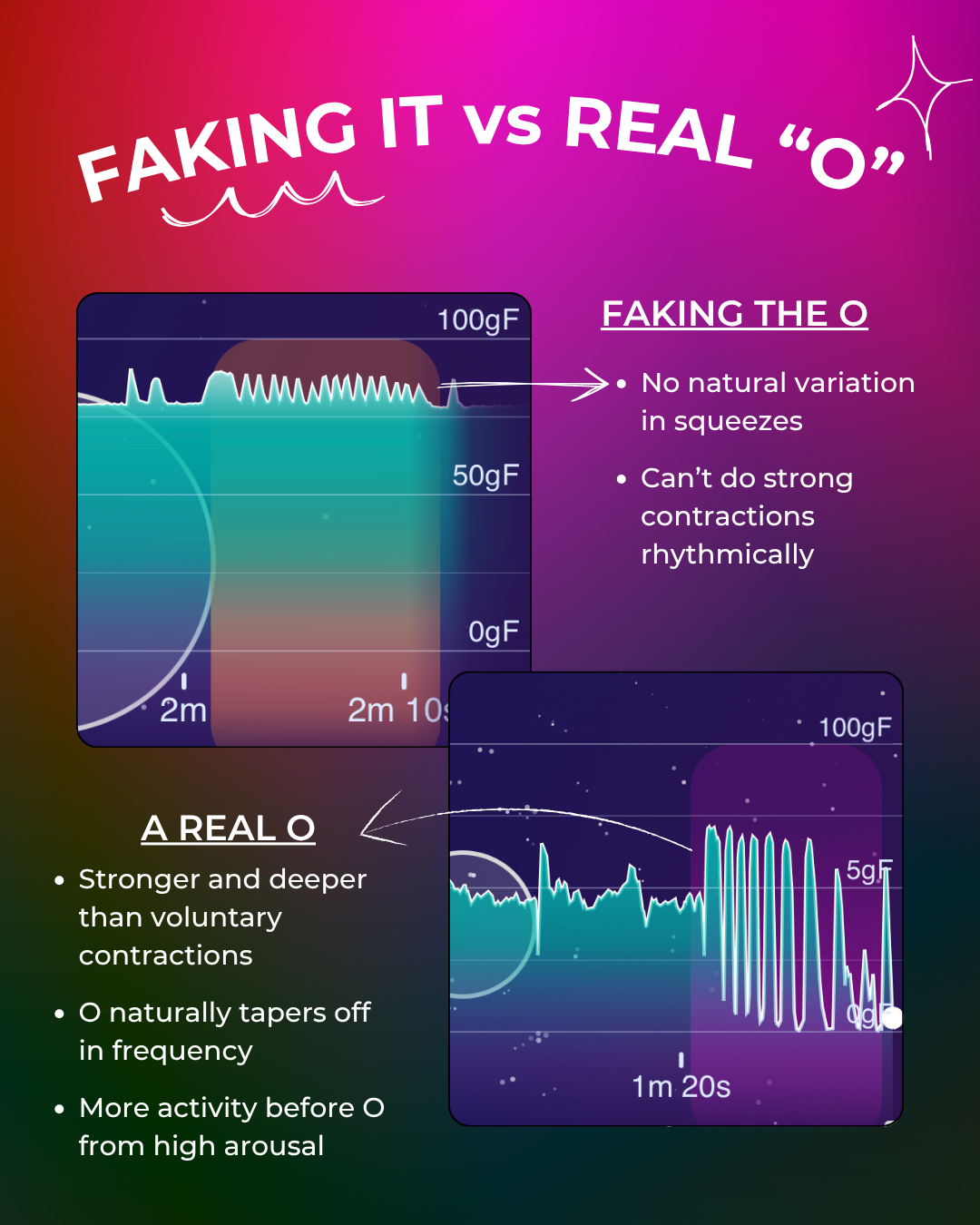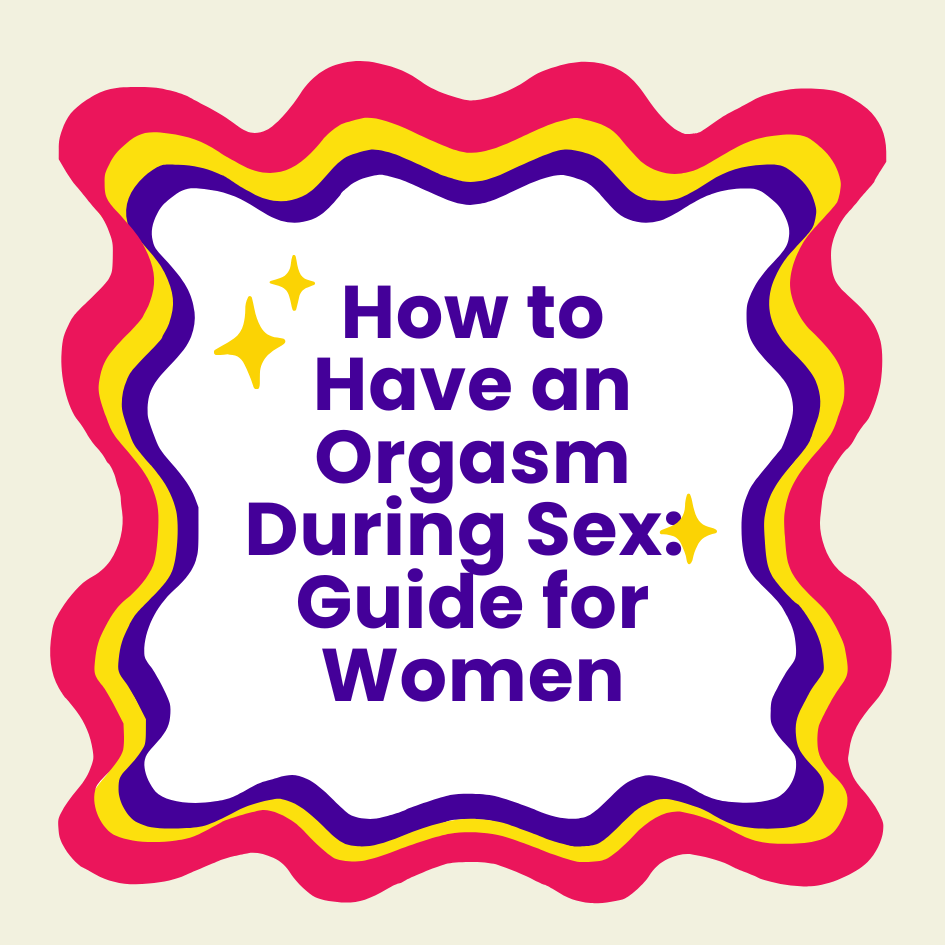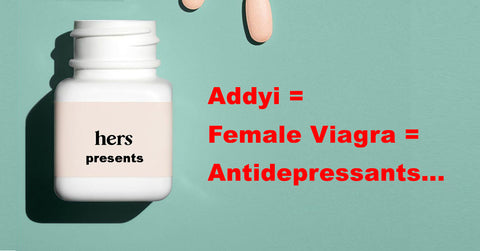
When you hear that Addyi, or “Female Viagra” is out on the market and available via telemedicine company Hers (a spinoff of Hims), you might think, “Yay! Progress for women!”. You’ll hear that there are 26 options of viagra for men...and until after 2016, only one (one!) for women. And now it’s available exclusively through telemedicine company Hims’ sister company Hers for anybody in the country to order online.
There’s one problem: while it’s casually called Female Viagra, it’s not equivalent to “male” viagra at all. Viagra originated from drugs that aided blood flow. “Female Viagra” is an antidepressant (there’s a lot of subtle details here that you can quibble with over that classification, but that’s the 80/20 of it).
Viagra aids in achieving a physical goal, while Addyi causes mental changes.
If you’re now saying, “Wait, aren’t antidepressants dangerous without careful guidance by medical professionals?” you’d be right. It comes with the side effects of antidepressants—you can’t drink (unless you want to blackout), you might get sleepy (and crash your car), and you need to take it everyday or else experience potentially brutal withdrawal. It’s why it has a “black box warning” from the FDA—the strictest warning they can give.
Many in the medical community were also more than a little wary. Dr. Emily Morse, also known as Sex with Emily, who is a human sexuality expert, recommended against it:

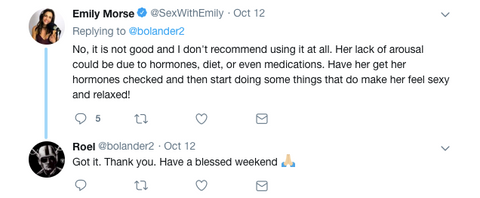
And now it’s available via telemedicine.
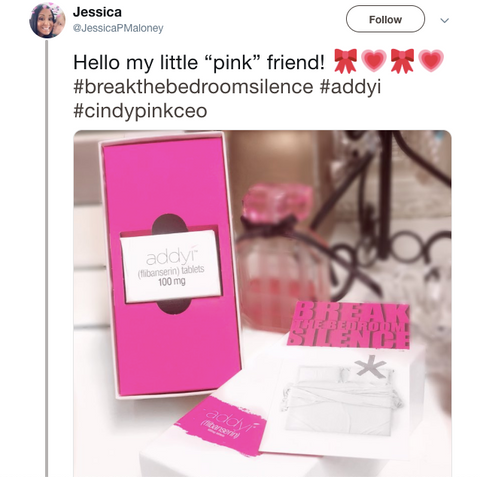
But wait, isn’t female sexuality all in the head?
If you follow the common trope that the “biggest sex organ” for women is their brain… of course! Of course, it’s not quite that simple. After all, it’s not like sexy situations and arousal for men is entirely devoid of brains and mental stimulation. A sexy encounter vs. tea at your grandmother’s house probably provides different quality of arousal for most men (but hey, if the latter is your thing… depending on what you do with it… all the power to you).
So yes—of course mental states matter for sexuality. But they do for men too, and we do women a disservice by over-indexing on stereotypical tropes. Too much emphasis on “it’s all in the mind” for women is just a modern-day version of the Puritanical “sex is really this special thing for women” whereas it’s just brute physicality for men. It does a disservice to sexuality of both women and men to make it so two-dimensional and binary.
I’m in the unique position where I’m working on the only modern-day device that can measure sexual arousal and orgasm for women, Lioness. We launched a year ago, have thousands of customers around the world, and we’ve already had numerous accounts of women discovering new things about their sexuality.
And yes, mental states matter. We’ve had a number of accounts of women deliberately changing their mental state to have a more positive sexual experience (such as experimenting with cannabis). However, physical steps change things too. Folks have tried out new techniques like edging which have made a visible impact for themselves through our tracking and biofeedback. We’ve even seen concussions affect sex life and quality of orgasms. We’ve started to work with MS and spinal injury clinics to understand this better.
So, as Dr. Emily Morse said above, there’s a lot of reasons why you might have libido issues. While it isn’t a bad thing in all cases, to simply “fix” female sexuality with Addyi—a long-term drug with massive mental and physical side effects—like the way Viagra is applied to “fix” male sexuality is like buffing out a scratch on your car with a sledgehammer. The scratch might not be visible anymore, but I’m not sure you’d like the end result either.
Who Benefits From This?
When Addyi was initially out, it was available only through a select few doctors. One reviewer who tried Addyi who lived in New York City had to travel 200 miles away to pick up her prescription...because not a single pharmacy in NYC was providing it at the time.
“Getting mine required several visits to New York’s (aptly named) Maze Women’s Sexual Health center, whose associate medical director, Melissa Ferrara, F.N.P., was among the first clinicians certified to prescribe it. Ferrara asked me a battery of questions about my relationship, current medications, and psychological and physical health. A nurse checked my blood pressure, hormone levels, and kidney and liver functions. My hard-won prescription could be filled only by a specialty pharmacy in Pennsylvania,200 miles from my home—and then only after an Addyi-certified pharmacist had called to review a list of warnings and possible side effects.”
Upon approval by the FDA, the drug giant, Valeant, bought the company that made it (Sprout) for $1 billion in 2015. Valeant spent massive amounts marketing the drug but ultimately failed due to widespread suspicion and opposition by medical practitioners and organizations like the National Women’s Health Network (NWHN). Because of all these problems, the launch was a failure. But Valeant isn’t willing to let it go—after all, that was a lot of money. In a weird turn, they sold it back to the original owners, and actually loaned an additional $25 million. They’re still trying to see if they can make this into a hit, a female version of the blockbuster Viagra. As per NWHN:
The pharmaceutical industry, however, is working hard to medicalize women’s loss of libido, branding it a health-related dysfunction that needs to be fixed with a pill. This is dangerous. Pharmaceutical companies have invested astonishing amounts of money in Addyi’s promotion despite the fact that its effectiveness, reliability, and safety are all highly questionable.
Is Hims just doing this for the clicks?
In the world of clicks, views, flashy PR, and internet drama, it is possible that Hims may be doing this as a PR ploy to get more people talking about Hims and Hers. After all, it’s pretty well-documented that Addyi had a bunch of PR when they came out, angered a lot of the medical community, and then pittered spectacularly. You couldn’t miss the drama that dominated the newscycle if you follow the space.
The Hims PR team is pretty savvy and this is one of those flashy millennial companies that rebrands things into make it cool and hip for my generation, I wouldn’t dismiss this possibility. On Addyi’s side, jumping into bed with a flashy millennial marketing company vs. a traditional pharmaceutical company could be the jumpstart that it needs to go from unheard of to into women’s cupboards everywhere.
It depends on a lot on how they do this. I hope they WILL be careful with it and push it sparingly and with cautions. After all, it is still a black label drug and not that many doctors can prescribe it. It’s also expensive. Addyi might be like what selling big screen TVs on Black Friday are: a doorbuster. You hear the claims of “better sex!”, come in, see that it’s hard to get or even unavailable...but hey, there are some other cool things here, so I’ll stick around. That’d be pretty smart marketing, I guess.
I’d hope that it’s a marketing ploy to get media attention—vs. them really hoping to get women everywhere hooked on antidepressants with the narrative that their sexuality is broken.
Is Addyi evil?
No. There is a time and a place and a purpose for every option, including drugs. Even ones that have a lot of potential drawbacks. It depends on the individual, and especially for drugs and these higher risk treatments, you’d want an expert who is familiar with the field to be able to understand your situation and understand the pros and cons. So no, Addyi is not evil, and in certain cases it can benefit women.
But because everyone’s situations are different and our society has such a huge problem talking about sex (and understanding the nuances of it), having Addyi be the one thing out there as a solution to help your sex life is dangerous.
There are a bunch of options out there, some more obvious than others: vibrators, stress management, adding some variety and spice to your sex life (whatever interests you—there’s a bunch of stuff out there for every taste), other stimulants...or just plain talking to your partner. All of these work in certain situations, and many experts will bring these up first before bringing up drug and procedure options that can radically change your body.
But because we’re in a culture where we take prescription drugs much more seriously and really don’t take our sex life that seriously, a lot of people just want to opt for the magic pill because everything else requires effort...they’ll want Addyi. And if they don’t know the pros/cons or just want a quick solution, they’ll find a way to get the pill, if not from one doctor, then maybe another. It’s happened numerous times with other drugs that are advertised on TV that might sound appealing, but a non-pill option could work much better. Or the progress of learning about your body and adapting a lifestyle that works for you could be much, much better.
But with pretty much anything sex-related, if it’s not a pill, it’s not allowed to be advertised on mainstream channels like TV, social media, and places where people are. Pharmaceutical companies have a long history of large advertising spend in mainstream channels in the US like television, and Hims has also advertised on social media platforms like Facebook. So for a lot of people, the only options they’ll come across day-to-day as solutions for sexual wellness are medications for something framed medical problems (which it might or might not be).
Will Addyi be one of those drugs that’s wildly picked up by pleasure seekers and those looking to reinvigorate their sex life? Or is this more part of Hims marketing strategy to get people to their new site? Only time will tell. If nothing else, I hope this move will have more people looking into the huge variety of options out their to improve their sex life, and help people understand that sexuality is more nuanced than just an erection, or just a pill.
===
Thanks for reading! Curious to learn more about my work?
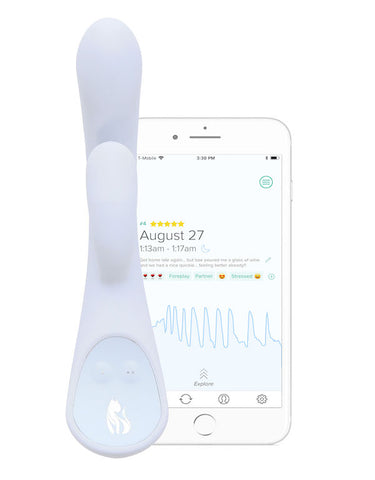 Lioness is the first and only vibrator that helps you improve your orgasms.
Lioness is the first and only vibrator that helps you improve your orgasms.The world’s most advanced vibrator. Precision sensors let you literally see your arousal and orgasm. Experiment, understand yourself, and have better orgasms — after all, as the saying goes, “never measured, never improved.
Click here to learn more.

